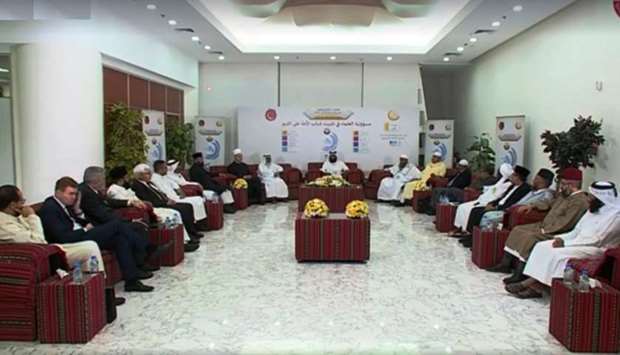Qatar is a distinguished role model in youth care programmes, identity preservation and maintenance of values, according to a group of noted scholars and thinkers.
“Qatar has a lot of elements that make it a leader in consolidating the values of moderation and mobilising the nation in the face of current challenges,” it was pointed out.
The remarks were made during the first session of an annual Ramadan programme by the Ministry of Endowments and Islamic Affairs, in which a group of intellectuals and scholars discuss the pressing issues.
The first session of the programme discussed the responsibility of scholars and thinkers to ensure that the nation's youth follow values.
The speakers touched on the current reality of the nation.
They also discussed the role of the nation's scholars and thinkers in bridging the rift, confronting extremist ideas, and activating the role of youth in construction and development.
Sheikh Dr Nawaf Hayel al-Takrouri, head of Palestinian scholars' association abroad, said Qatar has enough capacities and expertise to make it a leader in enhancing the role of moderate scholars, consolidating moderate religious discourse, and launching programmes and initiatives that bridge the gap between the nation’s intellectuals on one hand and the young people on the other.
Al-Takrouri said that the identity crisis requires a precise diagnosis and proper treatment, in addition to restoring the role of religious scholars, not those who spread evil, violence and extremism, which exacerbates the crisis of values and threatens the trust of the young people in scholars and preachers.
For his part, Sheikh Dr Thaqil bin Sayer al-Shammari, deputy head of the Court of Cassation and head of the fatwa committee at the Ministry of Endowments and Islamic Affairs, spoke about the crisis in inherent and human values.
Slovenia's Mufti Dr Nedzad Grabus was of the view that the Ramadan programme that gathers intellectuals and scholars from all over the Muslim world is an example of Qatar's keenness on what brings the nation together.
Dr Adel Raffouche, scientific director of Ibn Tachafin Foundation for contemporary studies and research in Morocco and Mohamed al-Hasan Ould al- Dedew, board member of the International Union of Muslim Scholars, pointed out the role of the scholarly institutions in interacting with youths, opening dialogue with them and touching on their intellectual and life problems, stressing the principle of moderation that Islam calls for.

